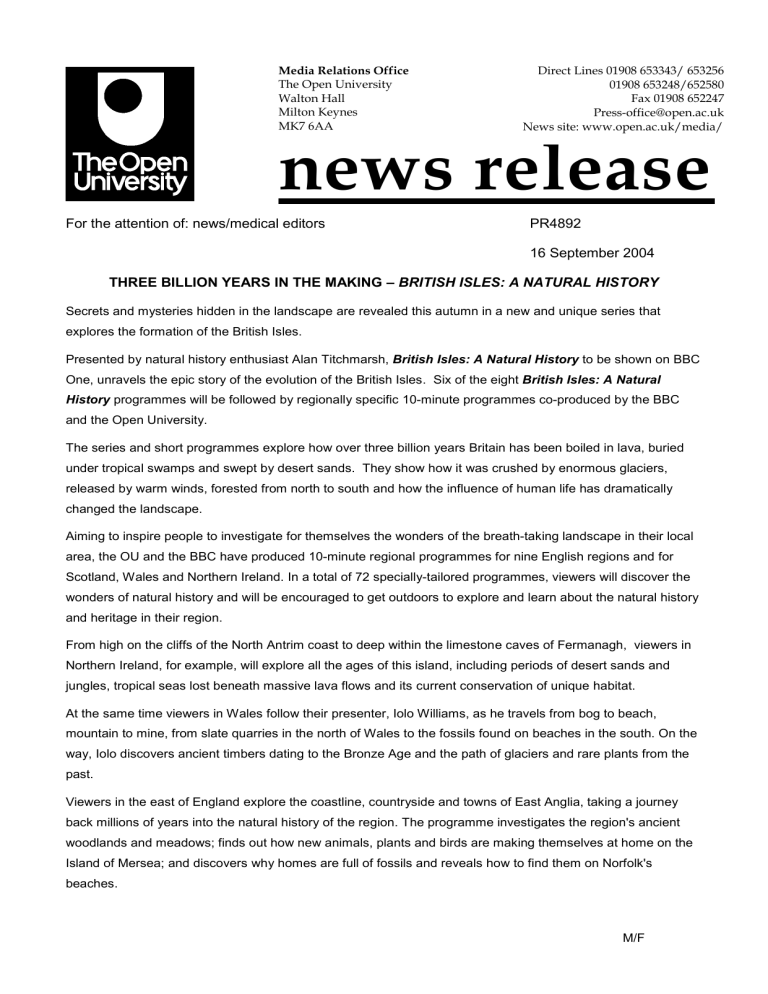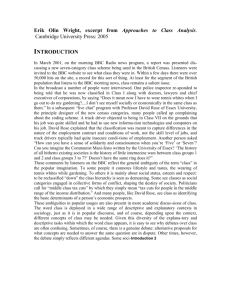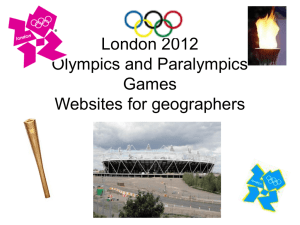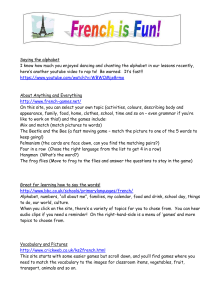Full news release - The Open University

Media Relations Office Direct Lines 01908 653343/ 653256
01908 653248/652580 The Open University
Walton Hall Fax 01908 652247
Milton Keynes
MK7 6AA
Press-office@open.ac.uk
News site: www.open.ac.uk/media/
news release
For the attention of: news/medical editors PR4892
16 September 2004
THREE BILLION YEARS IN THE MAKING – BRITISH ISLES: A NATURAL HISTORY
Secrets and mysteries hidden in the landscape are revealed this autumn in a new and unique series that explores the formation of the British Isles.
Presented by natural history enthusiast Alan Titchmarsh, British Isles: A Natural History to be shown on BBC
One, unravels the epic story of the evolution of the British Isles. Six of the eight British Isles: A Natural
History programmes will be followed by regionally specific 10-minute programmes co-produced by the BBC and the Open University.
The series and short programmes explore how over three billion years Britain has been boiled in lava, buried under tropical swamps and swept by desert sands. They show how it was crushed by enormous glaciers, released by warm winds, forested from north to south and how the influence of human life has dramatically changed the landscape.
Aiming to inspire people to investigate for themselves the wonders of the breath-taking landscape in their local area, the OU and the BBC have produced 10-minute regional programmes for nine English regions and for
Scotland, Wales and Northern Ireland.
In a total of 72 specially-tailored programmes, viewers will discover the wonders of natural history and will be encouraged to get outdoors to explore and learn about the natural history and heritage in their region.
From high on the cliffs of the North Antrim coast to deep within the limestone caves of Fermanagh, viewers in
Northern Ireland, for example, will explore all the ages of this island, including periods of desert sands and jungles, tropical seas lost beneath massive lava flows and its current conservation of unique habitat.
At the same time viewers in Wales follow their presenter, Iolo Williams, as he travels from bog to beach, mountain to mine, from slate quarries in the north of Wales to the fossils found on beaches in the south. On the way, Iolo discovers ancient timbers dating to the Bronze Age and the path of glaciers and rare plants from the past.
Viewers in the east of England explore the coastline, countryside and towns of East Anglia, taking a journey back millions of years into the natural history of the region. The programme investigates the region's ancient woodlands and meadows; finds out how new animals, plants and birds are making themselves at home on the
Island of Mersea; and discovers why homes are full of fossils and reveals how to find them on Norfolk's beaches.
M/F
2
In the countryside and in cities the wonders of geology are all around. In London, with its overcrowding, noise, fumes and frantic pace, it seems virtually impossible to think of it as part of a world of volcanoes, dinosaurs and vast oceans. The opt-out programmes for the London region takes a journey back millions of years into the natural history of the capital, discovering fossil formations in the building stones of the Royal
Festival Hall and the Economist Building and finding out how even the modern city contains natural wonders such as rare butterflies.
OU Professor Chris Wilson, Earth Sciences, and academic consultant on the series said:
“The ‘Walks Through Time’ will help people get started at being landscape detectives with the aid of three free leaflets available from the OU. Nearly all the walks will be to largely urban or urban fringe locations, and so should be easily accessible for families to go along and enjoy finding out about the geology, plants and animals in their area. “
Also, viewers interested in discovering the remarkable geology of other regions can watch the companion series British Isles: A User’s Guide To Natural History , a selection of the regional highlights at 9pm on BBC
Four, straight after the main series.
NOTES FOR EDITORS
British Isles: A Natural History , a new eight-part series to start at 8pm Wednesday, 29 th September on BBC
One unravels the epic story of the evolution of the British Isles. The final 10 minutes of the second to seventh programmes offer distinct regional segments, each reflecting the theme of the main programme. They have been co-produced with the Open University.
Get Walking
An interactive map on bbc.co.uk/nature guides the public to an exciting range of animated, downloadable walks on all of the BBC’s 56 ‘Where I Live’ websites. The ‘Walks through Time’ are especially developed alongside the series so the public can become landscape detectives and read the clues in their own area while they go on the walks. Mapped with the aid of Open University experts, each walk follows an urban or semi-urban family friendly route – accessible to wheelchairs and buggies – and takes in natural and historical surprises that exist in every corner of the British Isles. For more information on this and the weekend of walks on October 16 and
17 visit bbc.co.uk/nature and bbc.co.uk/whereilive websites and the Open University’s site at www.open2.net
You can also join the Great Snail Hunt at www.open2.net
. It’s all about counting snails. Snails give us insights into geology and climate change in Britain. It is the biggest snail survey ever attempted, so log on and add your results to the national survey.
Become a Landscape Detective
Whether looking for creepy crawlies or rocks in mine dumps, the OU’s ‘Landscape Detective’ Leaflets offer a handy guide to all budding young naturalists. They include advice on being a responsible landscape detective, equipment, habitats, animal tracks and all sorts of bugs. The leaflets are available free by calling 0870 787
4455 or by logging on to www.open2.net
.
Media Contact :
Eulina Clairmont Open University Media Relations Officer 01908 653248 e.clairmont@open.ac.uk
Hannah Sheppard BBC Bristol Press Officer 0117 9746608
Hannah.sheppard@bbc.co.uk






